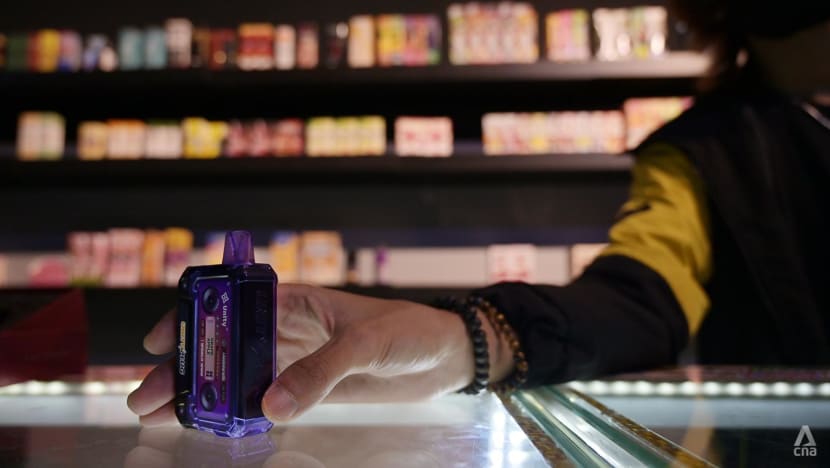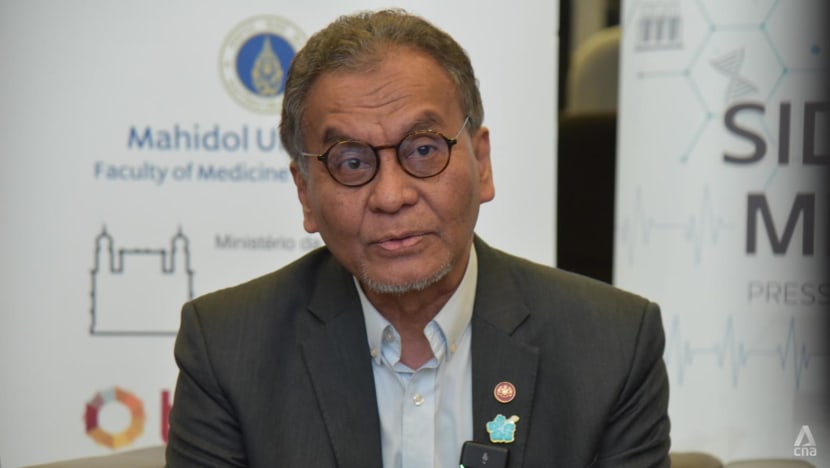‘Growing public health crisis’, love for nation behind move to fully ban vapes: Malaysia’s health ministry
In a statement to CNA, the ministry also responded to claims by industry players that the government has sent “conflicting signals” on vapes.


This audio is generated by an AI tool.
KUALA LUMPUR: The rising use of vapes among Malaysia's adolescents, along with increased reports of lung diseases and the misuse of drugs, points to a growing public health crisis in the country that fuelled its U-turn in moving towards a complete ban, says its health ministry.
Acknowledging that past opportunities to regulate or restrict vaping have not been fully seized, the ministry told CNA on Thursday (Oct 2) in response to queries on its proposed vaping ban that it is “worth reflecting on whether continued inaction is appropriate”.
It said this was especially “in light of growing evidence that highlighted the potential risks that vaping poses to individuals, particularly young people, as well as to broader public health and societal well-being”.
It pointed to 46 cases of E-cigarette or Vaping Product Use-Associated Lung Injury (EVALI), and the increasing misuse of drugs or illegal substances through vaping, evidenced by 136 vape liquid seizure cases and 172 arrests recorded by the Malaysian police between Jan 2024 and May of this year.
The ministry also cited the 2022 National Health and Morbidity Survey, which found that 14.9 per cent of Malaysian adolescents used e-cigarettes.
"The Ministry of Health adopts an approach rooted in love for the nation and its future generations, and will continue its efforts towards a full ban on vape as part of a collective commitment to protect the health and well-being of all Malaysians, in line with the goal to achieve the status of a smoke free nation by year 2040," it said.
Health Minister Dzulkefly Ahmad had said on Sep 25 that Malaysia plans to implement a nationwide ban on the sale and use of vapes by mid-2026, in the most definitive comments yet on the government’s intended action against e-vaporisers.
“The question is no longer if we ban vaping, but when,” he told reporters at the sidelines of an event in Cyberjaya.
This appears to be a U-turn from February, when Dzulkefly said that regulating rather than banning such products outright would allow authorities to better control the vaping and smoking ecosystem in the country.
RESPONSE TO "CONFLICTING SIGNALS"
The government’s apparent change in stance against vaping comes amid what some have described as “conflicting signals”, including how the health ministry was still allegedly accepting registrations for vape products.
Some market players added that the government also recently informed them about the likelihood of a hike in the tax on vape e-liquids. Currently, the tax on vape e-liquids is 40 sen per millilitre.
To register vape e-liquids in Malaysia, companies must submit an application to the health ministry, which includes a RM5,000 (US$1,200) fee and a laboratory analysis report, among other requirements.
The devices, meanwhile, require certification from the Standards and Industrial Research Institute of Malaysia - the government body that tests and verifies product compliance before market entry.
Responding to CNA’s queries on industry players’ claims about the continued registration of products, the health ministry said that the registration of smoking products is subject to the existing requirements under the Control of Smoking Products for Public Health Act 2024, commonly referred to as Act 852.
The ministry added that until any amendments are made to the Act, companies or individuals may still apply for the registration of vape products.
Act 852 regulates the sale, packaging and labelling of tobacco products and smoking devices in Malaysia, including e-cigarettes and vapes.
The ministry told CNA that a cabinet memorandum has been prepared and will be tabled soon to seek the legal authority to halt product registration prior to the full review and implementation of a full ban on vape products.
On the proposed higher taxes, the health ministry said that the process of a full vape ban would take time to implement due to the legislative procedures involved in making “comprehensive amendments to Act 852”.
“Therefore, existing enforcement measures must be strengthened, especially in the lead-up to and during the implementation process, to ensure a smooth transition and to address potential issues, including the risk of a black market emerging,” it said.
“Regarding taxation … it is crucial to enhance control over vape accessibility, not only as preparation for the full ban but also to send a clear message about the current dangers of vape products.”

The ministry also acknowledged another concern raised by some industry players and health experts: That a total ban on vapes could lead to a black market.
“Based on the experiences of countries that have implemented vape bans, challenges such as smuggling and the emergence of black markets are to be expected,” it said.
“Addressing these issues requires a whole-of-nation approach, particularly through the strengthening of government enforcement agencies.”
It added that while the ministry is stepping up enforcement, the roles of non-governmental organisations and community groups must also be strengthened to support such action initiatives and to increase public awareness.
“These efforts are crucial in driving behavioural change towards fostering a healthier society, free from vape products and tobacco smoke,” it said.
On Oct 1, the state of Perak announced that it would implement a ban on the sale of electronic cigarettes or vapes in all business premises from January of next year.
So far, six other states – Johor, Kelantan, Terengganu, Perlis, Kedah and Pahang – have implemented similar bans, although these bans do not outlaw the use of vapes in the states.
Neighbouring country Singapore has been stepping up enforcement against vaping, with stepped-up checks at the country's air, land and sea checkpoints as well as in various parts of the island.
Harsher penalties for vaping offences also came into force on Sep 1, with etomidate - the anaesthetic agent that has been found in vapes - listed as a Class C drug under the Misuse of Drugs Act.


















